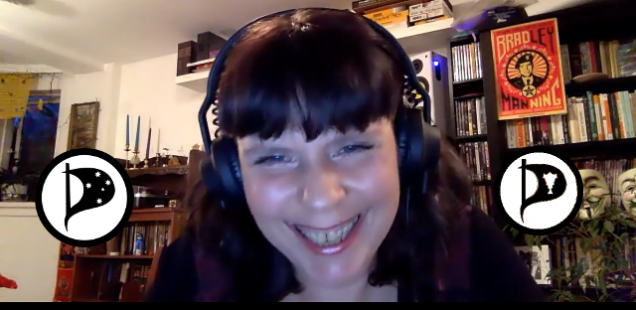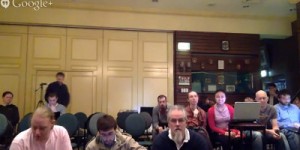PPAU Congress: Unhappy with PPI – will they form 5 Eye Patches? | PirateTimes

PPAU Congress: Unhappy with PPI – will they form 5 Eye Patches?
The Australian Pirates are paragons of democracy. Following their general assembly in Brisbane on 19-20 July 2014 we had to wait for the results until now, as all Australian Pirates can vote on motions and candidates whether they attend the physical meeting or not.
Birgitta Jónsdóttir gave the keynote speech which can be viewed on youtube.
Birgitta told the Australians that writing legal code is very similar to writing computer code. It needs to be well written, understandable and without loopholes for corporates and others to get around. Pirates in parliament can write good laws but when there are no Pirate MP’s, we need to identify other representatives that are able to draft good bills.
Birgitta feels that we are at an important moment in history and need to prepare ourselves for the crises that are bound to come. Crises that can be used to introduce Pirate-based reforms during the short window of opportunity that will emerge. We need to experiment with communities, both on- and offline and with democratic innovations (such as liquid democracy).
She also advised Pirates to concentrate on core policies, like direct democracy and be fully versed in those areas rather than trying to cater to everyone.
Pirate Party Australia currently has 1.100 qualified members. The voting turnout during the GA was 25% but this included everyone since members were able to participate via distance during the event. They also managed to get a lot of work done in the two days of meeting followed by one week of email voting.
A new national council was elected:
- President: Brendan Molloy
- Deputy President: Simon Frew
- Secretary: Daniel Judge
- Deputy Secretary: Fletcher Boyd
- Treasurer: Ben McGinnes
- Deputy Treasurer: Mark Gibbons
- Registered Officer: Michael Keating
- Councillor (1): Melanie Thomas
- Councillor (2): David Campbell
It is a wise move to have deputies for the main roles. If anything unfortunate should happen to one of these key people, the deputy can seamlessly take over their role. This would prevent, in the case of the treasurer, access to the bank account from being suspended for long periods, whilst the legal formalities are settled.
During the GA new policies (or changes to existing ones) were made in the following areas:
- Constitutional reform
- Copyright
- Education
- Energy, Environment and Climate Change, & Animal Welfare
- Tort of Privacy
- Tax and Welfare
Most controversial was a motion to give the executive council the power to withdraw membership from Pirate Parties International. The motion was passed by 92.57% of the participating members. The minutes show that party members are unhappy with their relationship within the international body. Frustration was expressed about the lack of progress concerning remote participants in general assemblies and their ability to have their voice heard. Efforts to change procedures for the GAs were seen as being ignored. Additionally, the members also had a hard time to see any real advantage to membership in PPI.
There is talk of forming a “Five Eye Patch” collaboration between Pirate Parties from the notorious “Five Eyes spying alliance” (countries of the UK, Canada, the US, New Zealand and Australia). There is certainly a cultural and historic bond between these countries, but it is hard to see what more would be gained apart from being able to share some English language resources. The international Pirate Movement needs more communication between parties and members across culture and language barriers. Global, regional and cultural groups can enhance this but they must be very careful not to be exclusive. Pirate Party opponents would love to see a fractionalized Pirate movement.
The international movement is not defined by PPI, which PPI doesn’t want either. One Australian Pirate raised the question: “What do PPI even do?” That is not easy to answer as there is ambiguity in its stated purpose. The “about” web page says that it was formed as an NGO to advocate on the international level for the promotion of the goals that their members share. However, the statutes say that their aims are to assist in the creation of new Pirate Parties and to foster communication between national Pirate Parties and their members. There is no reason it cannot do both, but up until the election of the current board it seems to have concentrated on the former to the cost of the later.
It is up to the grass-root members of the Pirate Movement to advocate the shape they want the international movement to take in the future. As Birgitta indicated in her speech:
We need to get ready for the next crisis.
Featured image: CC BY-SA Pirate Times composite from PPAU and PPIS

About Andrew Reitemeyer
I joined the Pirate Party of Lower Saxony in Germany in April 2012, once I found out that non citizens were welcome to join and become active members of the Party.
I joined the Pirate Times soon after it was started as a proof reader and am now an editor and author. Since then I have returned to my native New Zealand and joined the Pirate Party of New Zealand.
Politically I come from the libertarian left and have, up to now, not regarded any political party as having a solution for the democratic deficit that envelops the world. With the advent of the Pirate Party, which truly embraces grass roots democracy, I have found a political home. The Pirate Times is a way I can contribute to furthering the Pirate Movement around the world.
Skype: frithogar
All content is CC-BY if not mentioned otherwise. Please link back to us if using content.


















Lanta
Mozart
Lanta
Mozart
@collentine
Mozart
Andrew McPherson
Mozart
Jelena Jovanovic
Peter Fulton
Jelena Jovanovic
Peter Fulton